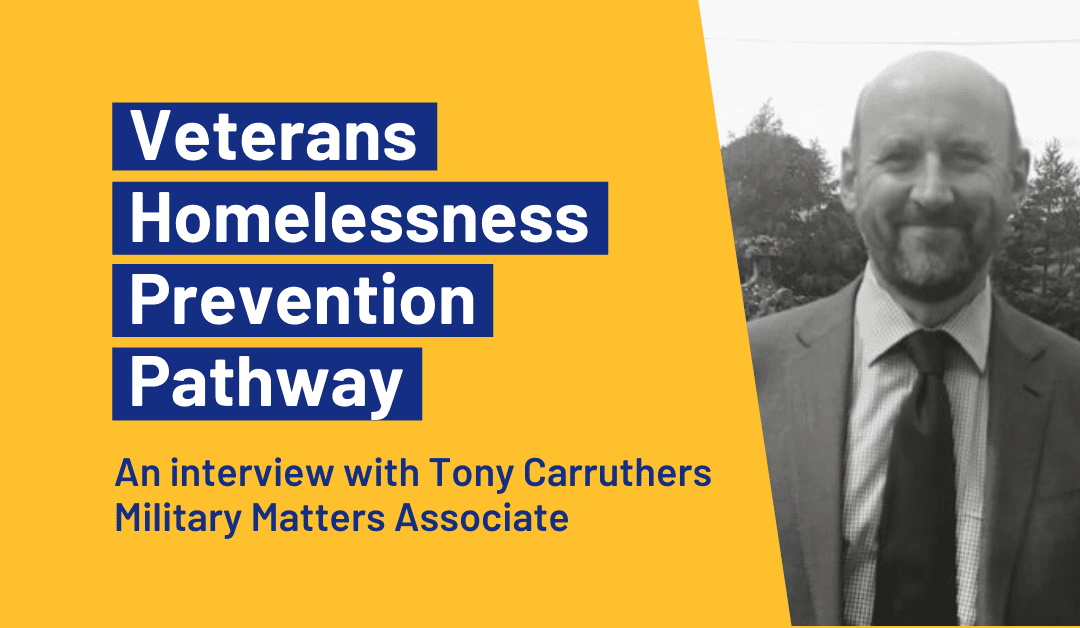Tony Carruthers is our Military Matters Associate. He was recently involved in producing the Homelessness Prevention Pathway report for veterans, which was formally launched at the Scottish Parliament Cross Party Group on the Armed Forces and Veterans Community in January 2022. We had a chat to Tony about his involvement:
How did you become involved with working with veterans?
I was in the Navy for 8 years. When I left, I got involved in HR and I worked for a Housing Association, where I learnt an awful lot about housing and some of the barriers that people face in accessing housing. The organisation I worked for had partly been responsible for setting up HOS, so that’s what led me initially to be on the board and then working as a veteran when Military Matters came along.
How did the report come about?
The Scottish Government were the driving force behind it. They identified a need for a Homelessness Prevention Pathway in the same way that there had been one put in place for care leavers and people leaving the prison population; they saw that veterans were a strand also at risk so needed to be included in their overall homelessness prevention strategy.
Veterans are leaving a kind of institution where a lot of your day to day activity is all governed for you. Some of our early work was trying to encourage the Ministry of Defence and the Armed Forces in Scotland to make sure that the information that was being provided to people who are leaving the military and therefore becoming the next generation of veterans reflected the housing options people have in Scotland and the places that they wanted to live and resettle.
Who contributed to it?
The natural avenue for the Scottish Government to interact with the veterans sector is through Veterans Scotland, so the idea was for the Housing Pillar in the organisation to coordinate a Homelessness Prevention Pathway. The Housing Pillar is the specific membership focus for housing within the service charity sector in Scotland (of which HOS is a member). There are around ten other active organisations in the housing side of Veterans Scotland.
From Veterans Housing Scotland, Kevin Gray their CEO was acting as the chair of the Veterans Scotland housing pillar at that point, so he coordinated the task that was given to the Pillar from the Scottish government to research and publish this pathway.
Housing Options Scotland were asked to participate, so I was involved from the Military Matters perspective of HOS. We had the added bonus of Steve Rolf from the University of Stirling getting involved: Steve and I had been working on a piece of research in the couple of years before the Homelessness Pathway kicked off. This project had its roots in HOS work too and looked at housing information and the provision of housing information to veterans across the whole of the UK. Having Steve move from that piece of research to helping out with the research on the Housing Pathway Homelessness Pathway meant that we had lots of learning from him and his experience in terms of report writing, etc. It also meant that we had a focus for pulling the whole thing together. As part of our research, we ran several focus groups to gather information and hear of people’s experiences first hand. We spoke to other service charities too who provided direct support to people who were at risk of homelessness, and their support for veterans and their families. The report took around a year to complete.
Who is the report targeting?
The vast majority of people who leave the military go on to do well in their next career, whatever that may be. But the issue that Pathway hopes to address is the people who fall through the cracks.
If you invest in providing targeted transition at the time people are leaving the Armed Forces and ensure that veterans are best equipped to deal with whatever challenges come up, then you would hope that they go on not to need as much intervention from other agencies. The aim is to help people find their own way and to signpost organisations such as HOS who can help them. That way they may not then need to engage with other agencies such as local authorities, the NHS, or those providing emergency accommodation. So it’s all about prevention, and that’s a key word in the pathway. We’re preventing homelessness.
What do you hope to see happen from the report?
I’d like to see that the recommendations adopted and we’d like to see them implemented in full as far as possible. Research obtained by talking to recent service leavers engaging with the Defence Transition Service in Scotland showed us that accommodation was usually their primary issue. It wasn’t employment or healthcare or anything. It was accommodation. So again, we need to address the risks of homelessness before it happens and that way we prevent people from falling through the cracks.
Do you think the report will influence others as well as the government?
I think it can influence opinion and prompt action from many sides of the homelessness problem. For example, HOS have taken some different approaches over recent years and got involved with the Forces Families Federations, so that you’re involving the families of the service person and helping families navigate through their housing options. So that’s a different focus to it. There’s the focus through the serving people and linking into the key people within the military that we need to speak to and we’ve been doing that well in recent years. We have established some good working relationships with key decision makers. Then there’s people working in local authorities. We’re getting there, I think. And we’re talking to all the right people; it just means we have to keep plugging away.

